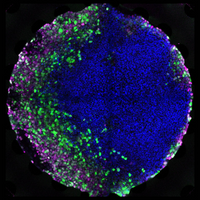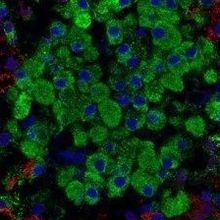Login
Subscribehuman embryonic stem cells, cell & molecular biology

NIH Announces Details of Human Fetal Tissue Research Restrictions
Ashley Yeager | Jul 29, 2019 | 2 min read
The latest restrictions require scientists to submit more comprehensive grant applications, and those applications will go through more stringent ethics reviews.

Image of the Day: Multilayered
Chia-Yi Hou | Jul 8, 2019 | 1 min read
Human embryonic stem cells differentiate and organize themselves on a chip.

Animals’ Embryonic Organizer Now Discovered in Human Cells
Jim Daley | May 23, 2018 | 4 min read
The finding confirms that a cluster of cells that directs the fate of other cells in the developing embryo is evolutionarily conserved across the animal kingdom.

Stem Cells Made Waves in Biology and Medicine
Karen Zusi | Oct 1, 2016 | 6 min read
Since their introduction to the lab, pluripotent stem cells have gone from research tool to therapeutic, but the journey has been rocky.

Thirty Years of Progress
The Scientist | Oct 1, 2016 | 1 min read
Since The Scientist published its first issue in October 1986, life-science research has transformed from a manual and often tedious task to a high-tech, largely automated process of unprecedented efficiency.

Lab-Made Insulin-Secreting Cells
Bob Grant | Oct 13, 2014 | 1 min read
Researchers craft hormone-producing pancreas cells from human embryonic stem cells, paving the way for a cell therapy to treat diabetes.

Week in Review: April 28–May 2
Tracy Vence | May 2, 2014 | 3 min read
Male scientists stress mice out; using SCNT to reprogram adult cells; acetate can reach mouse brain, reduce appetite; WHO sounds “post-antibiotic era” alarm

A Twist of Fate
Jonathan Slack | Mar 1, 2014 | 10+ min read
Once believed to be irrevocably differentiated, mature cells are now proving to be flexible, able to switch identities with relatively simple manipulation.

A Wild Stem Cell Chase
Signe Cane | Jul 24, 2013 | 3 min read
A rigorous new study provides strong evidence that very small embryonic-like stem cells hypothesized to be found in mice and humans do not exist.

hESC Opponents File with Supreme Court
Jef Akst | Oct 11, 2012 | 2 min read
Scientists fighting the federal funding of human embryonic stem cell research bring their case before the country’s highest court.
Hard-to-Get Stem Cells
Jef Akst | Dec 14, 2011 | 2 min read
More than one quarter of US researchers studying human embryonic stem cells say they’ve had trouble acquiring cell lines of interest.
Human ES Cells Evolve in Culture
Ruth Williams | Nov 28, 2011 | 3 min read
Researchers identify common genetic changes in cultured human embryonic stem cells, including one that confers a growth advantage.
No European Patents for Stem Cells
Edyta Zielinska | Oct 19, 2011 | 1 min read
The high court in Europe decided that researchers are barred from filing EU patents on work involving human embryonic stem cells.
New Way to Make Embryonic Stem Cells
Amy Coombs | Oct 5, 2011 | 3 min read
A breakthrough in somatic cell nuclear transfer opens the possibility of producing human embryonic stem cells with a patient’s own genes.
Skipping Pluripotency
Jef Akst | Sep 14, 2011 | 5 min read
Researchers are developing ways to convert mature somatic cells from one cell type to another, avoiding the tumor-causing pluripotent stage associated with stem cells.
Americans Support Stem Cell Research
Jef Akst | Jul 1, 2011 | 2 min read
A new study finds that more than two thirds of Americans approve of the use of stem cells in research aiming to cure serious diseases.
